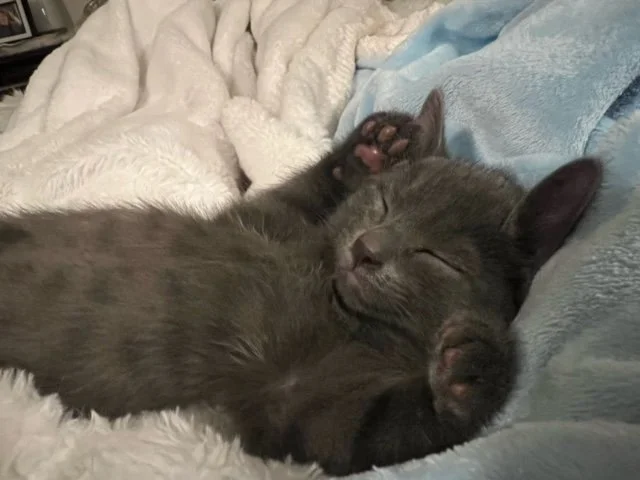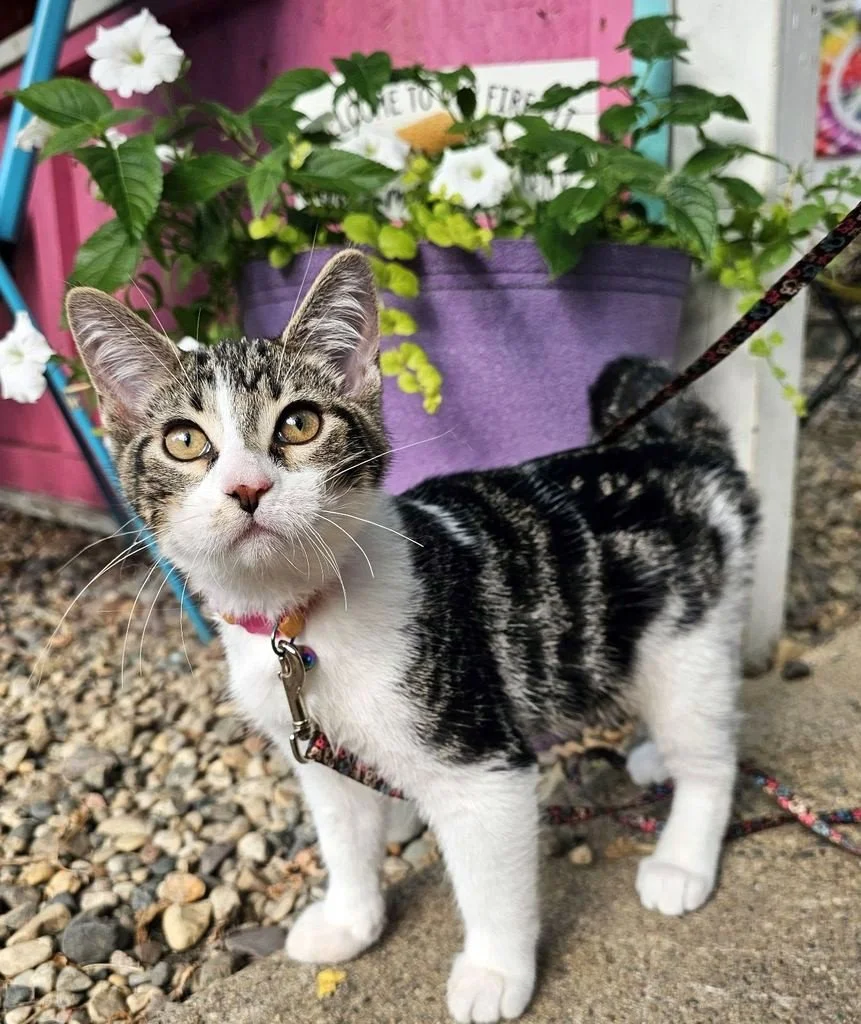Interacting with a Shy Cat or Kitten Who Was Socialized Late
/
From NYC Eartips: Winter 2009
by Nancy Alusick, KittyKind, and Kathleen Goward, Anjellicle Cats
KittyKind occasionally finds itself with cats and kittens who are shy because they were not socialized during the crucial ages of development — around 2–12 weeks. We have a number of volunteers who generously donate their time to work with these cats so that they can be placed into permanent homes. These volunteers use a technique which offers food as an incentive for the cats to interact and ultimately seek affection from people.
The cats and kittens are placed in a small space, such as a bathroom, where they can become accustomed to the presence of people. The volunteer first places a plate of food a few feet from her and then slowly, over time, moves the plate closer and closer. When the cats are comfortable eating from a plate placed in close proximity, the volunteer very gently begins to stroke the cat. The cats become accustomed to touch and in time begin to seek out the attention of people.
We call these cats "Extra Special" because, when they are adopted, their new guardians will need to take extra time to acclimate the cats to their new environment and to actively interact with them. It is important to play with the cats and feed them in a location where the cats can be petted while they are eating. The cats will very quickly bond with their new owners and, because they are "Extra Special," KittyKind will continue to provide extra advice and support to the new owners.
1) Cats are creatures of habit and love predictable environments. During the first few days, avoid making loud or sudden noises, and always leave an escape route for the cats so that they feel they can protect themselves by retreating to a hiding place.
2) Most cats will exhibit shy behavior when introduced to new environments. Cats are cautious animals by nature and tend to look for the protection and comfort of an environment where they can fully or partially conceal themselves. As they become more accustomed to the sights, sounds, people, and animals in the new space and realize that they will not be physically harmed, they will leave their hideaway and seek companionship and sustenance.
3) When the cat has become comfortable eating from the food dish, sit down a foot away from the dish and, after a few moments, reach over from behind and gently stroke her. Never bring your hand directly toward the cat's face, as this will startle her. As your cat becomes accustomed to the petting, over time move the food dish to different spots in your home. Cats are "site specific" in that they associate certain behavior with various locations. You cat will associate your affection with the food and with the location of the food dish. Even when the food dish is removed, she will think of the location as a safe spot to receive and give affection.
4) Use toys to engage your cat or kitten in play. Feather toys or string toys attached to poles are great devices to coax your pet to come closer to you.
5) Do not stare at your kitty. When you do make eye contact, slowly lower your lids, blink, or close your eyes. You will see him do the same in response. If he is nervous at your touch, the stress can be reduced, if again, you close your eyes — no predator kills with its eyes closed. In the natural world of prey and predator, when one stares at the other, it means someone is about to be someone else's dinner. DO make eye contact when you have food, a treat, or a gift.
6) Walk around with a ribbon tied behind you so that your cat gets to feel like she is chasing you. If she approaches to check you out, be still and let her investigate you.
7) A hawk is a cat's natural enemy. Don't look like one by swooping down on him. Your new kitty will like you best if you are sitting on the floor or a couch where you can be at his level.
8) If your kitty runs when you pass her, pass her with your back to her.
9) NEVER yell at or punish your cat.
10) Prepare in advance for any vet appointments by serving the food in the carrier for a week or so before the appointment. On the appointed day, wait for the cat to go in and close the door.
11) When you pick him up, do it slowly and gently.
Your cat's introduction will be a little slower. She may require a little more effort, but once you've won her over, the bond is even stronger and she will become the most special cat you've ever had. It's all there waiting for the person who nurtures it.
by Nancy Alusick, KittyKind, and Kathleen Goward, Anjellicle Cats
KittyKind occasionally finds itself with cats and kittens who are shy because they were not socialized during the crucial ages of development — around 2–12 weeks. We have a number of volunteers who generously donate their time to work with these cats so that they can be placed into permanent homes. These volunteers use a technique which offers food as an incentive for the cats to interact and ultimately seek affection from people.
The cats and kittens are placed in a small space, such as a bathroom, where they can become accustomed to the presence of people. The volunteer first places a plate of food a few feet from her and then slowly, over time, moves the plate closer and closer. When the cats are comfortable eating from a plate placed in close proximity, the volunteer very gently begins to stroke the cat. The cats become accustomed to touch and in time begin to seek out the attention of people.
We call these cats "Extra Special" because, when they are adopted, their new guardians will need to take extra time to acclimate the cats to their new environment and to actively interact with them. It is important to play with the cats and feed them in a location where the cats can be petted while they are eating. The cats will very quickly bond with their new owners and, because they are "Extra Special," KittyKind will continue to provide extra advice and support to the new owners.
Following are some tips to accelerate the process:
1) Cats are creatures of habit and love predictable environments. During the first few days, avoid making loud or sudden noises, and always leave an escape route for the cats so that they feel they can protect themselves by retreating to a hiding place.
2) Most cats will exhibit shy behavior when introduced to new environments. Cats are cautious animals by nature and tend to look for the protection and comfort of an environment where they can fully or partially conceal themselves. As they become more accustomed to the sights, sounds, people, and animals in the new space and realize that they will not be physically harmed, they will leave their hideaway and seek companionship and sustenance.
3) When the cat has become comfortable eating from the food dish, sit down a foot away from the dish and, after a few moments, reach over from behind and gently stroke her. Never bring your hand directly toward the cat's face, as this will startle her. As your cat becomes accustomed to the petting, over time move the food dish to different spots in your home. Cats are "site specific" in that they associate certain behavior with various locations. You cat will associate your affection with the food and with the location of the food dish. Even when the food dish is removed, she will think of the location as a safe spot to receive and give affection.
4) Use toys to engage your cat or kitten in play. Feather toys or string toys attached to poles are great devices to coax your pet to come closer to you.
5) Do not stare at your kitty. When you do make eye contact, slowly lower your lids, blink, or close your eyes. You will see him do the same in response. If he is nervous at your touch, the stress can be reduced, if again, you close your eyes — no predator kills with its eyes closed. In the natural world of prey and predator, when one stares at the other, it means someone is about to be someone else's dinner. DO make eye contact when you have food, a treat, or a gift.
6) Walk around with a ribbon tied behind you so that your cat gets to feel like she is chasing you. If she approaches to check you out, be still and let her investigate you.
7) A hawk is a cat's natural enemy. Don't look like one by swooping down on him. Your new kitty will like you best if you are sitting on the floor or a couch where you can be at his level.
8) If your kitty runs when you pass her, pass her with your back to her.
9) NEVER yell at or punish your cat.
10) Prepare in advance for any vet appointments by serving the food in the carrier for a week or so before the appointment. On the appointed day, wait for the cat to go in and close the door.
11) When you pick him up, do it slowly and gently.
Your cat's introduction will be a little slower. She may require a little more effort, but once you've won her over, the bond is even stronger and she will become the most special cat you've ever had. It's all there waiting for the person who nurtures it.










